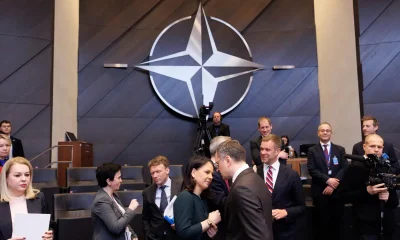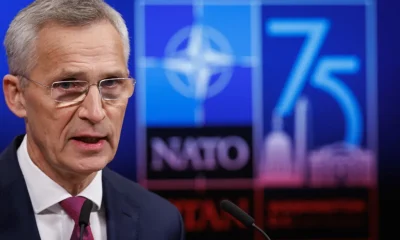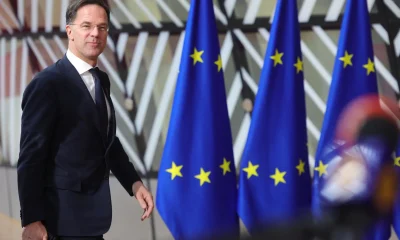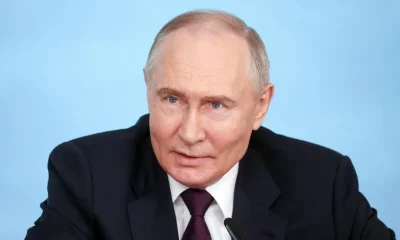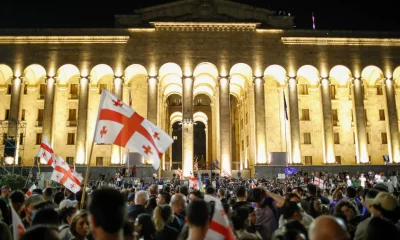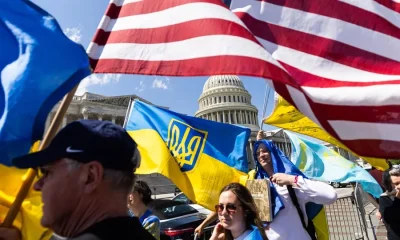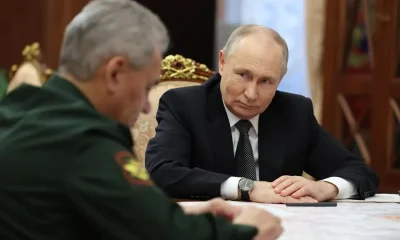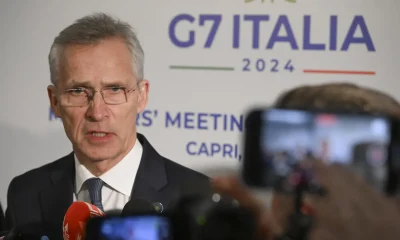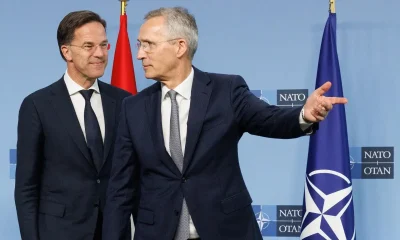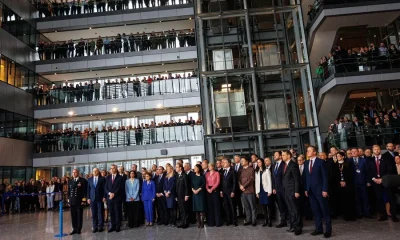International
Stoltenberg assures that NATO countries are willing to give more Patriots to Ukraine
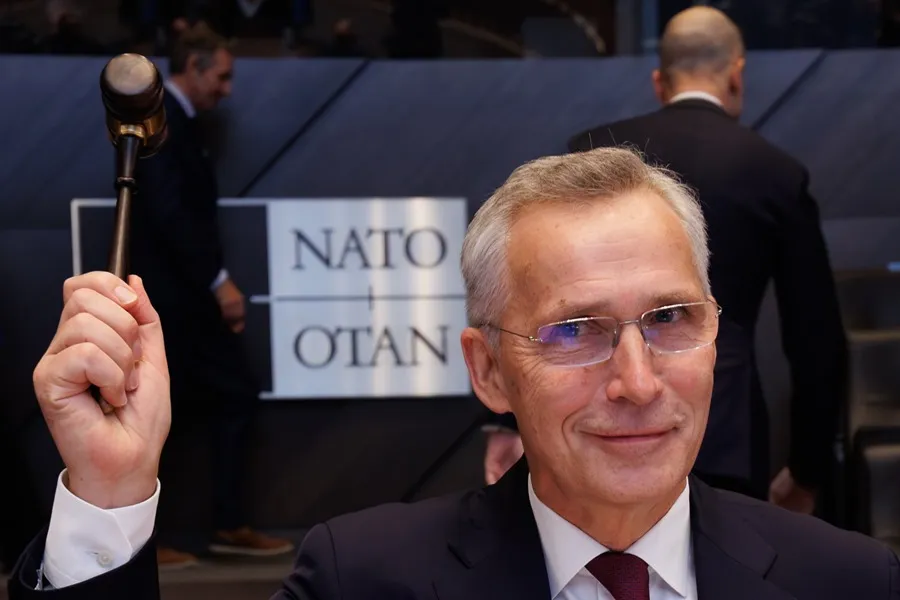
NATO Secretary General Jens Stoltenberg said on Thursday that the allies are willing to strengthen Ukraine’s air defenses, especially Patriot anti-missile batteries, after the specific request made today by the Ukrainian Foreign Minister, Dmitro Kuleba.
“The allies understand the urgency of accelerating when it comes to air defense, so they will now look in their inventories or if there is a way they can provide more systems, in particular Patriots,” Stoltenberg said at a press conference at the end of a two-day meeting of the Alliance’s Foreign Affairs heads.
At the same time, he said that it is necessary to make sure that the air defense systems that are already deployed in Ukraine “have the ammunition and spare parts to work as they should.”
“In part it is a question of battery systems, but it depends a lot on the delivery of the interceptors of the systems that are already there,” he explained.
Stoltenberg assured that several allies promised that they will make “a new effort to find what they can, see what else they can provide.”
The 32 allied ministers participated today in a meeting of the NATO-Ukraine Council after attending a ceremony to celebrate the 75th anniversary of the Atlantic Alliance.
“I don’t want to water the anniversary party, but my main message today will be Patriots, because saving Ukrainian lives, saving the Ukrainian economy, saving Ukrainian cities, depends on the capacity of the Patriots and other air defense systems,” Kuleba told the press upon his arrival at the meeting.
“The situation on the battlefield is still serious. Ukraine needs more air defenses, more ammunition and more help,” Stoltenberg stressed.
The Allied Secretary General listed that, in recent days, Germany has announced about 600 million euros for the Czech initiative to acquire artillery ammunition, the United Kingdom has announced the shipment of 10,000 drones to Kiev, France will give more missiles and armored vehicles and Finland will provide a new aid package worth 188 million euros.
“But we have to do even more. And we need to establish our support on an even firmer and more lasting basis,” he said.
Therefore, yesterday, Wednesday, the allied ministers agreed to move forward in the planning of a greater role of NATO in the coordination of aid and security training for Ukraine, a work that will continue in the coming weeks.
Stoltenberg indicated that the allies must move forward on these two aspects: the mobilization of urgent aid in the coming days and weeks and the establishment of “a more predictable framework for long-term support” that “does not depend on voluntary ‘ad hoc’ announcements, but on more predictable commitments.”
In this way, the allies have entrusted the supreme commander of the Alliance for Europe (SACEUR), American General Christopher G. Cavoli, start the planning of that framework, which “could be underpinned by financial commitments.”
Stoltenberg has proposed to create a fund of 100 billion euros for five years for Ukraine so that the support has a long-term journey, at a time when it is possible to return in November to the White House of Republican Donald Trump, who has already said that he would cut off attendance to Kiev.
“Russia is mobilizing more troops, but it is also willing to sacrifice men and material for marginal profits. This is serious, and that is exactly why it is urgent to mobilize more support for Ukraine,” argued the Norwegian politician.
He warned that there are fundamentally two possible scenarios: that the allies are able to mobilize more support and that Ukraine can recover more territory, or “that we are not able to do so.”
“And then there is a real risk that Russia will capture even more territory and that we will find ourselves in an even more dangerous position,” he said.
In his opinion, if NATO allies comply, he was convinced that Ukraine will be able to make new advances, and therefore “we must thoroughly seek and provide more military support” and put in place “stronger and more solid structures in the long term.”
Stoltenberg also insisted again that they have “no plan to have combat troops within Ukraine, there has been no request for it.”
The fact that the allies are providing him with weapons to defend himself “does not make us part of the conflict,” he said.
International
Federal Judge Blocks Trump Policy Allowing Deportations to Third Countries

A federal judge ruled on Wednesday that the policy of U.S. President Donald Trump’s administration allowing immigration authorities to deport foreign nationals to third countries without prior notice or the opportunity to object is unlawful. The decision marks another legal setback for the administration on immigration matters.
Judge Brian Murphy of the U.S. District Court for the District of Massachusetts struck down the regulation issued last year, which stated that Immigration and Customs Enforcement (ICE) was not required to notify migrants if they were to be sent to countries other than the one listed in their removal order, provided that receiving nations offered assurances they would not face persecution or torture.
Murphy ordered the measure vacated but granted a 15-day delay before the ruling takes effect, giving the Trump administration time to file an appeal.
In his decision, the judge concluded that the policy violates federal immigration law and migrants’ due process rights. He also questioned the lack of transparency surrounding the alleged assurances provided by receiving countries, stating that “no one really knows anything about these supposed ‘assurances.’” He added, “It is not right, and it is not lawful.”
The ruling follows several legal disputes involving deportations to third countries. Last year, the executive branch deported more than 200 Salvadorans to a maximum-security prison in El Salvador, invoking an old wartime law. The White House also held talks with Costa Rica, Panama, and Rwanda about receiving migrants who are not citizens of those countries.
In May, the same judge determined that the government violated a court order when it attempted to remove a group of immigrants with criminal records to South Sudan without prior notice or an opportunity to raise claims of fear of persecution.
Although President Donald Trump took the case to the U.S. Supreme Court, which temporarily allowed the deportations to resume while a final decision was pending, the White House is expected to again appeal to higher courts to overturn this latest judicial ruling.
International
Cocaine Production Surges 34% in 2023 as Market Expands into Africa and Asia

The global cocaine market is the fastest-growing among all illicit drugs worldwide, the International Narcotics Control Board (INCB) warned on Thursday in its annual report presented in Vienna.
The body attributes this expansion to the sustained rise in production in South America — particularly in Colombia — as well as increasing demand in emerging regions such as Africa and Asia.
According to the report, global cocaine production surpassed 3,700 metric tons in 2023, marking a 34% increase compared to 2022. This growth is largely driven by the expansion of illicit coca cultivation in Colombia and the greater production capacity of clandestine laboratories.
The INCB noted that the market has not only grown in volume but has also diversified and become more globalized. While Europe and North America remain the primary destinations, trafficking routes now reach “all regions of the world,” including Africa — traditionally considered a transit zone — and Asia, where the presence of cocaine was previously marginal.
In Western and Central Europe, for the fifth consecutive year, seizures in 2023 exceeded those in North America, consolidating the region as the leading destination market. Between January 2019 and June 2024, more than 1,826 metric tons of drugs bound for European ports were seized, of which 82% was cocaine, equivalent to 1,487 metric tons.
The report also highlights that seizures in Africa rose by 48% in 2023 compared to 2022, reflecting the expansion of the market on the continent. Globally, the number of cocaine users increased from 17 million in 2013 to 25 million in 2023.
International
Clinton Accuses Republican Committee of Using Epstein Case to Shield Trump
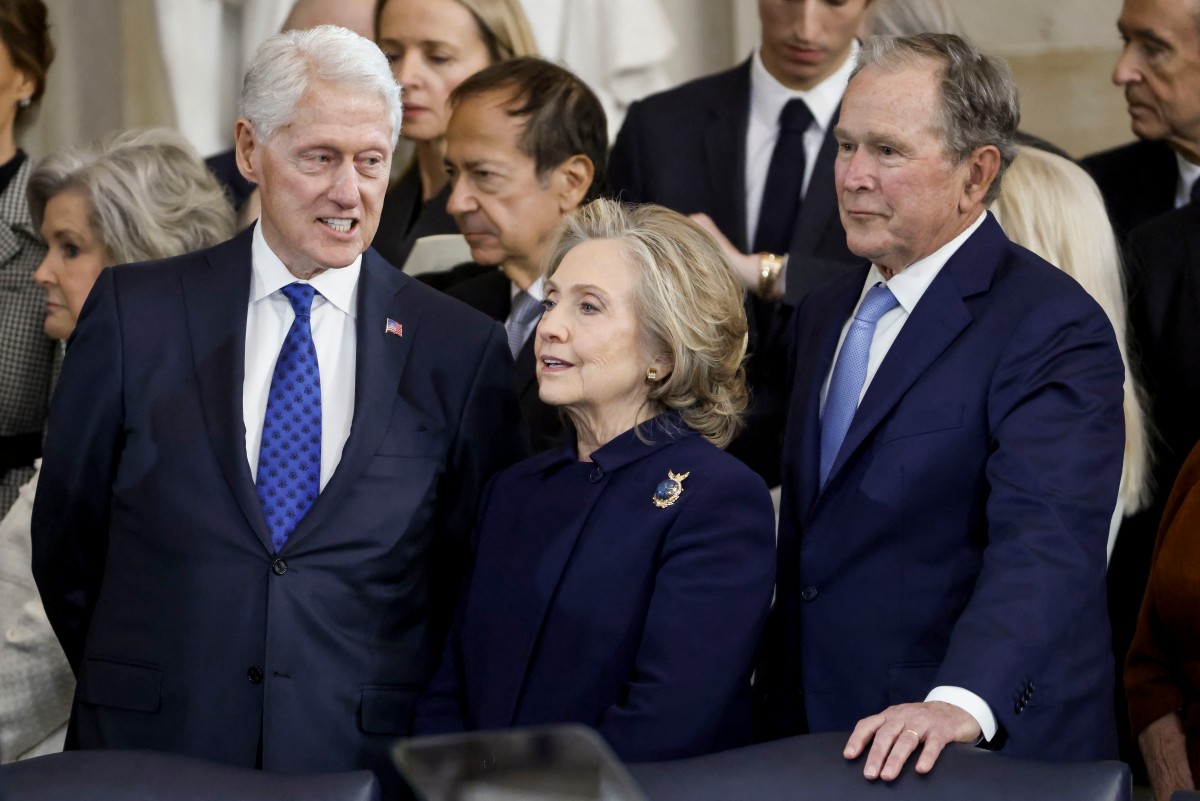
Former U.S. Secretary of State and former First Lady Hillary Clinton denied on Thursday before a congressional committee that she had ever met convicted sex offender Jeffrey Epstein in person or had any knowledge of the crimes he committed.
Clinton testified behind closed doors from New York before the House Oversight Committee. The wife of former President Bill Clinton — who is scheduled to testify on Friday — accused the Republican-controlled committee of summoning her in order to “distract attention” and “cover up” the activities of President Donald Trump, who had past ties to Epstein.
“I do not recall ever meeting Mr. Epstein. I never flew on his plane nor visited his island, his homes, or his offices. I have nothing further to add,” she stated.
The former Secretary of State emphasized that she “had no idea about the criminal activities” of the financier, who died in prison in 2019. “Like any decent person, I was horrified when I learned of his crimes,” she said.
Clinton described the Epstein case as “a tragedy” and “a scandal” that deserves “a thorough investigation,” but criticized the committee for failing to summon what she called the truly relevant individuals.
“Instead, you have asked me to testify, knowing that I have no knowledge that would serve your investigation, with the purpose of distracting from President Trump’s activities and shielding him despite the legitimate demand for answers,” she said.
The questioning, conducted behind closed doors in Chappaqua, New York — where the Clintons reside — took place one day before former President Bill Clinton was scheduled to appear at the same location.
Although the Clintons initially declined to testify before Congress, the threat of being held in contempt ultimately led the former presidential couple to agree to appear and explain their relationship with Epstein.
-

 International1 day ago
International1 day agoFamily of “El Mencho” Seeks Return of Body After Deadly Military Operation
-

 International1 day ago
International1 day agoLarry Summers Steps Down from Harvard Role Amid Epstein Controversy
-

 International4 days ago
International4 days agoNinth Victim Recovered After Deadliest U.S. Avalanche in Decades
-

 International3 days ago
International3 days agoOver 40 Million Affected by Major Snowstorm in Northeastern U.S.
-

 International1 day ago
International1 day agoIran’s President Optimistic Ahead of Geneva Nuclear Talks with U.S.
-

 International1 day ago
International1 day agoStephen Hawking Photo Appears in Newly Released Epstein Documents
-

 International1 day ago
International1 day agoBill Gates Admits “Serious Mistake” Over Epstein Ties
-

 International3 days ago
International3 days agoNine People Killed in Two Armed Attacks in Manabí, Ecuador
-

 International1 hour ago
International1 hour agoClinton Accuses Republican Committee of Using Epstein Case to Shield Trump
-

 International59 minutes ago
International59 minutes agoCocaine Production Surges 34% in 2023 as Market Expands into Africa and Asia
-

 International58 minutes ago
International58 minutes agoFederal Judge Blocks Trump Policy Allowing Deportations to Third Countries



























